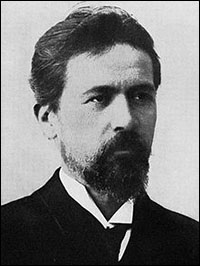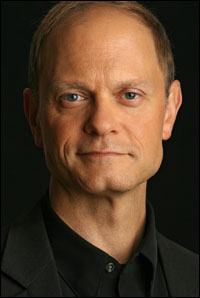
*
Anton Chekhov would doubtlessly be surprised — and probably pleased — to see how Ivan Petrovich Voinitsky (a.k.a. his Uncle Vanya) has fled the endlessly boring hell of a rustic Russia on the cusp of the 20th century and time-traveled to new environs.
Films have plopped his play down in North Wales (1996's "August," directed by Anthony Hopkins, starring him, Kate Burton and Gawn Grainger), Australia's Outback (1994's "Country Life," directed by Michael Blakemore, starring John Hargreaves, Greta Scacchi and Sam Neill) and New York's pre-renovated New Amsterdam (1994's "Vanya on 42nd Street," a David Mamet take, directed by Louis Malle and Andre Gregory, starring Wallace Shawn, Julianne Moore and Larry Pine).
Where next? Vanya in Bucks County, it appears. A Christopher Durang reexamination world-premiered Sept. 7-Oct. 7, 2012, at Princeton's McCarter Theatre Center and moved that fall to Lincoln Center's Mitzi E. Newhouse Theater under the title of Vanya and Sonia and Masha and Spike. (It's now on Broadway, at the Golden Theatre.)
"My play is not a Chekhov parody," the author says at the top as a kind of cautionary warning. "I've been saying that I take Chekhov scenes and characters and put them into a blender. It's my hope you don't have to know Chekhov super-well to enjoy it.
| |
 |
|
| Anton Chekhov |
The swift Chekhov scholars out there have already picked up on the fact that there's no Masha in Uncle Vanya. There's one each in The Three Sisters and The Seagull, but nada in Vanya. "And my Masha is actually not like the Masha in either of those plays. I just decided I liked the sound of Masha better. Truthfully, she's a bit more like Madame Arkadina in The Seagull. She's the one who has not stayed home her whole life. She has gone and become a famous actress, and it's her country estate she's thinking of selling. Even though Madame Arkadina wasn't selling her home, she handled the purse strings."
There is a cherry orchard talked about but never seen, and there aren't three sisters — only a sister and brother and stepsister. The latter two, Vanya and Sonia, "are somewhat closer to Chekhov than the other characters. They're the ones staying at the estate doing all the work. Sonia is a little bit like the Chekhov Sonia in that she has never found romantic fulfillment. She doesn't have a specific character like the doctor to fixate on, but she's kinda unhappy and bitter about things.
"Spike is the boy-toy of Masha. She's had five unsuccessful marriages, and — a la Ashton Kutcher and Demi Moore — she has taken up with a younger man for the first time. Usually, she married people her own age, but suddenly she's with this (she says) 29-year-old. Vanya and Sonia think she's probably added some time to him."
| |
 |
|
| David Hyde Pierce | ||
| Photo by Joan Marcus |
"The sixth character is maybe the closest to Chekhov. It's Nina next door — definitely Nina of The Seagull in Act One when she's still young and fresh and looking forward to life. She comes in because she's such a big fan of Masha the movie star."
Director Nicholas Martin has outfitted the play with seasoned Durang regulars. Sigourney Weaver, the glamorous Masha, has been doing Durangs since their second week at Yale School of Drama. Runner-up in the muse department is stepsister Sonia, Kristine Nielsen, marking her fifth Durang. And the Vanya of the event, the easily exasperated David Hyde Pierce, made his Broadway debut — suddenly — as a very funny sight-gag in Durang's 1982 Beyond Therapy (i.e., the perpetually paged waiter who doesn't show up until a gun goes off — and then he's there like a shot!).
A topic to steer clear of with Durang is Robert Altman's film facsimile of Beyond Therapy. "No, I didn't like what Altman did to that," he is quick to admit. "He rewrote it a lot, and, in rewriting it, the psychology of the characters got more than a little fuzzy. They just seemed to be running around being crazy all the time, but there wasn't any logic to it. It certainly had good actors, but it wasn't very good."
The playground for V&S&M&S is present-day Bucks County, PA, where Durang has lived 14 years with his partner, John Augustine. "The play, I do want to say, is a comedy — in an American way. Some of it ends up a little better than you might think for Chekhov. Now that I'm older, I don't like sending people home feeling too despairing, so, maybe for my own sake, I like to cheer things up a bit." And why not? Chekhov considered his plays comedies of the human condition. Durang's an impudent imp famous for fun-poking Brecht, Catholicism, cinema, marriage, parenting, et al — but he has his limits, as I recently learned with I rushed into print an urban myth that had been stuck in my head a good quarter of a century — to wit, I swore he once wrote an Amadeus spoof set at The Public Theater, with Joe Papp as the emperor, Elizabeth Swados as Salieri and Marvin Hamlisch as Mozart. Durang asked that the reference be cut from a Playbill.com piece that I wrote about Hamlisch's recent passing. The playwright said that never wrote such a playlet, but he had to admit, "it sounds like something I might have written."
(A version of this feature first appeared on Playbill.com in September 2012.)

Evan-Zimmerman-for-MurphyMade.jpg)







